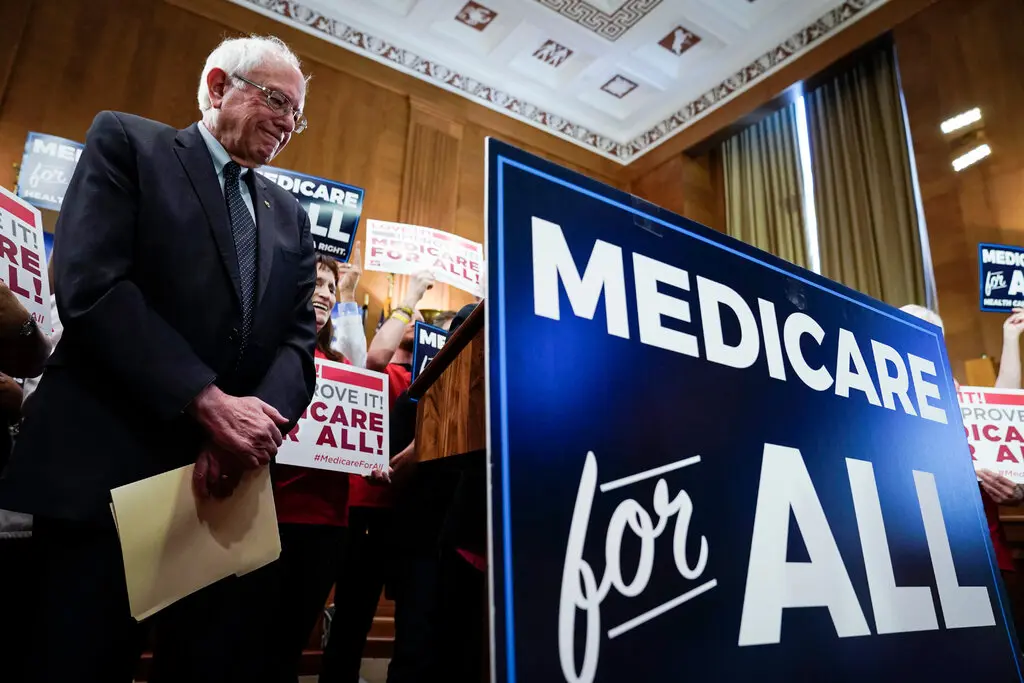The topic has been a major concern in presidential elections for decades. Its absence as a top issue now is notable.
Donald J. Trump tried to repeal Obamacare in 2017. Kamala Harris proposed a fundamental restructuring of U.S. health care in 2019, a move to a single- payer system.
These bold ideas were no aberration. In nearly every major presidential race for decades, health care has been a central issue. Remember Bill Clinton’s (doomed) health reform plan? George W. Bush’s Medicare drug plan? Mitt Romney’s Medicare privatization proposal? Bernie Sanders’s Medicare for all?
As you may have noticed, with less than two months until Election Day, big, prominent plans for health reform are nowhere to be seen. Even in an election that has been fairly light on policy proposals, health care’s absence is notable.
There were no days of either party’s convention devoted to the plight of the uninsured or the middle-class families saddled with high premiums. Health care is only briefly mentioned in either candidate’s stump speeches or television ads. There aren’t even full pages on the candidates’ websites with their plans for an industry that represents a sixth of the U.S. economy — though the Harris campaign recently published several paragraphs. When the Affordable Care Act came up at the debate, near the end, the candidates offered few specific policy proposals.

“This is the first election in maybe decades where health reform has not been a central issue,” said Larry Levitt, the executive vice president for health reform at KFF, a health research group.
The topic is not completely absent from the political conversation, as Mr. Levitt noted. Both candidates do discuss the high cost of prescription drugs, and several Democratic convention speakers applauded drug price reforms passed in the Biden administration. Abortion has been a major campaign theme for Ms. Harris, who has also talked about medical debt and defending Obamacare. But no one is focusing on major reforms of the health insurance system.
Health care’s new status as a second-tier issue was clear in the debate Tuesday, when the moderators asked Mr. Trump about his previous efforts to repeal Obamacare. They did so as the penultimate question of the debate, highlighting how marginal the issue has become relative to other voter concerns. Mr. Trump was particularly vague in his response, saying he had “concepts of a plan” to improve the insurance system. Ms. Harris mainly said she wanted to “maintain and grow the Affordable Care Act.”
“Republicans think they can ignore health care,” said Michael Cannon, the director of health policy studies at the libertarian Cato Institute. “They can’t. Democrats think they have solved health care. They haven’t.”
The absence of a prominent debate is puzzling to policymakers on both the right and the left. Many conservatives are concerned about the growing costs of the government’s large health programs: Medicare, Medicaid and Obamacare. And many Democrats worry about the looming expiration of health insurance subsidies that could raise premiums for millions of Americans after next year.
“The fact that both parties have decided we’re not going to tackle the health entitlement crisis is really odd,” said Brian Blase, president at the Paragon Health Institute, a right-leaning think tank, and a former member of the White House National Economic Council in the Trump administration. Mr. Blase noted that limiting Medicare’s future budget trajectory was a longtime priority for most Republicans and many Democrats. (Both Mr. Clinton and Barack Obama proposed major Medicare reforms as president.)
Mr. Blase said this lack of attention to the fiscal concerns reflect “this populist moment right now, where neither party wants to deal in reality.”
Both candidates have learned the hard way that proposing major changes can alienate some voters even as it thrills others. Mr. Trump’s unsuccessful effort to repeal Obamacare in 2017 was followed by major Democratic gains in the 2018 midterms. Ms. Harris faced intense criticism after a 2019 Democratic primary debate in which she appeared to endorse abolishing private health insurance.
The overall state of the health system is also different now. After years of crises and emergencies, no part of the system is currently ablaze. Obamacare markets have settled and grown after a rocky launch. The uninsured rate is near a record low. Obamacare has become popular. Overall health care spending, while high and growing, has not been following its historically steep trajectory.
As a result, voters today are more focused on other issues like the cost of living or the Southern border. And on the health care topic that both candidates have spent time talking about — prescription drugs — Mr. Trump and Ms. Harris largely agree that the federal government should rein in high pharmaceutical prices.
“When people feel less vulnerable, it makes the demand for a whole new system go down,” said Linda Blumberg, a professor of public policy at Georgetown and fellow at the Urban Institute. “I think there’s some recognition of that.”
The fact that the candidates are relatively quiet about health care does not mean they would manage the health system in the same way if elected.
Although Ms. Harris has not spoken about it in detail, a sentence on her campaign website indicates she, like Mr. Biden, supports an extension of health insurance subsidies that are scheduled to expire next year. Her campaign has said she no longer supports the single-payer plan she endorsed in her last presidential run. And in the debate, she emphasized that she supports private insurance for many Americans. She also wants to limit how much customers need to pay out of pocket for prescription drugs.
And while Mr. Trump has explicitly vowed not to cut Medicare, his first-term record suggests he may seek to make major changes to Medicaid, including the addition of work requirements, changes to the way the program is financed, and deep cuts to long-term funding.
His first term also suggests he would manage Obamacare markets differently, encouraging health plans that have to follow fewer rules, cutting funding for advertising, and allowing the extra subsidies to expire. The health care chapter of Project 2025, a detailed document of policy prescriptions for Mr. Trump to consider if elected, encourages such policies and was written by a former top Trump health official.
And while he declined to articulate a proposal on Tuesday, he also did not rule out the possibility of another effort to repeal Obamacare and replace it with a different system.
That means the health care stakes could still be large, even if the conversation is smaller.







